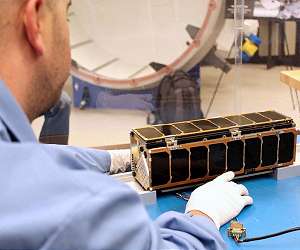Spaceflight’s Second Rideshare Mission with Rocket Lab Slated Next
Spaceflight, the leading satellite rideshare and mission management provider, has announced it has managed the procurement, integration, and mission management services for three spacecraft on Rocket Lab’s next mission aboard an Electron rocket.
This mission, called “Look Ma, No Hands” by Rocket Lab, represents Spaceflight’s second of several launches scheduled with Rocket Lab this year, and follows the launch of seven spacecraft on its inaugural “Make it Rain” mission with Rocket Lab in late June from Launch Complex 1 at the southern tip of Mahia Peninsula, on the east coast of New Zealand’s North Island. The first launch opportunity is no earlier than 13:24 UTC, Friday, August 16th.
Spacecraft on the mid-inclination (45 degrees) mission to a 540km x 540km orbit include:
+ BlackSky’s Global-4, a microsatellite class Earth-imaging system, was developed, designed, and manufactured by BlackSky, a leading provider of geospatial intelligence, satellite imaging, and global monitoring services.
Like its predecessors (Global-1, -2, and -3) already on orbit, Global-4 will provide 1-meter resolution color imagery, building upon the constellation’s objective of providing a fast revisit rate critical for organizations detecting and monitoring changes in locations of interest around the world.
Global-4 is the company’s second satellite in the BlackSky constellation deployed to an inclined orbit and will work in conjunction with Global-3 to demonstrate the initial high revisit rate service. Global-4 also introduces some significant capability upgrades to the satellite including a “green” water-based propellant system.
+ United States Air Force Space Command’s “Pearl White” is an Air Force Space Command demonstration program whose goal is to design, develop, launch and operate two 6U cubesat experimental spacecraft as an on-orbit testbed for emerging technologies in 2019.
The demonstration will test new technologies including propulsion, power, communications, and drag capabilities for potential applications on future spacecraft. The two cubesats were built by Tiger Innovations Inc., who will operate the spacecraft for the life of the program under the direction and oversight of AFSPC.
“We’re looking forward to offering our customers a regular cadence of launches with Rocket Lab,” said Curt Blake, CEO of Spaceflight. “Our second Electron launch is off to a mid-inclination orbit which is necessary for these customers to fulfill their business and mission objectives. Having multiple launches across different launch vehicles gives our customers the flexibility they need to mitigate risk from potential delays.”
This mission marks Spaceflight’s fifth launch of 2019. In addition to the “Make It Rain” mission in June, it follows the successful launch and deployment of 21 spacecraft aboard PSLV C45 in March 2019, as well as the GTO-1 mission, launching the first commercial lunar lander in February aboard a SpaceX Falcon 9. Additionally, in December 2018, Spaceflight executed the company’s historic dedicated rideshare mission, SSO-A, which launched 64 unique smallsats.
To date, the company has negotiated the launch of more than 270 satellites and has plans for approximately eight more missions in 2019 launching more than 50 payloads across a wide variety of launch vehicles, including the Falcon 9, Antares, Electron, Vega, Vector, PSLV, and LauncherOne.
Related Links
Spaceflight
Microsat News and Nanosat News at SpaceMart.com
|
We need your help. The SpaceDaily news network continues to grow but revenues have never been harder to maintain. With the rise of Ad Blockers, and Facebook – our traditional revenue sources via quality network advertising continues to decline. And unlike so many other news sites, we don’t have a paywall – with those annoying usernames and passwords. Our news coverage takes time and effort to publish 365 days a year. If you find our news sites informative and useful then please consider becoming a regular supporter or for now make a one off contribution. |
||
|
SpaceDaily Contributor $5 Billed Once credit card or paypal |
SpaceDaily Monthly Supporter $5 Billed Monthly paypal only |
|

![]()
Saber Astronautics given mission control status for CUAVA-1
Sydney, Australia (SPX) Aug 06, 2019
Professor Iver Cairns, Director of the ARC Training Centre for CubeSats, UAVs and their Applications at the University of Sydney, has announced that Saber Astronautics has been awarded the satellite operations contract which will provide essential flight software, satellite integration and mission control support for the inaugural flight of a CUAVA satellite.
Saber Astronautics will provide three months of continual spacecraft operations of CUAVA-1 from their mission control centres in Sydney, Aus … read more
